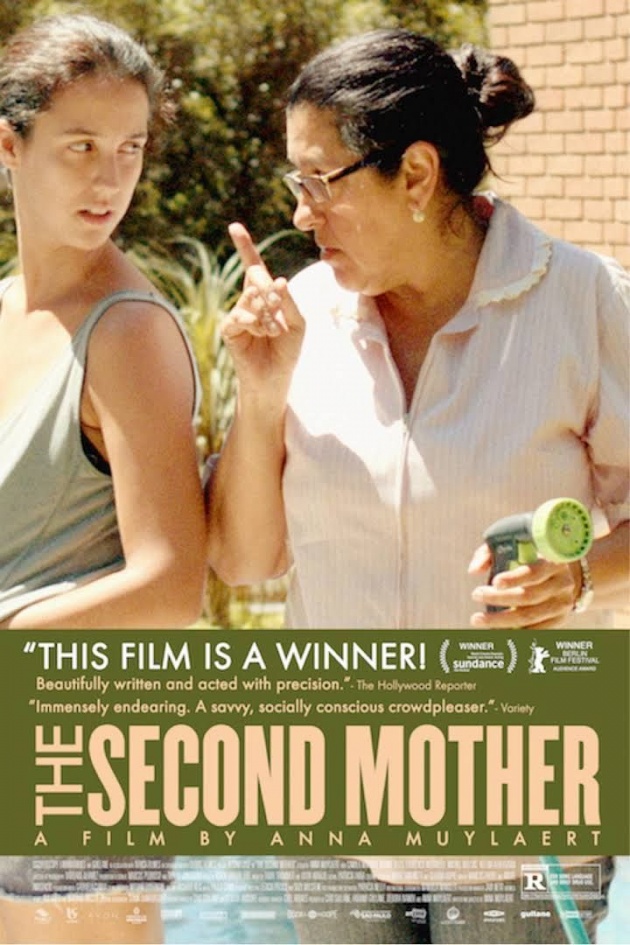
You know when you are fully immersed in a drama when a breakage on screen startles you. In director Anna Muylaert’s The Second Mother (original title: Que horas ela volta?) Val (Regina Casé) is cleaning an old tray, a family heirloom when the handle falls off. It is one of a series of acts that puts her in real danger, economically speaking. Val is the maid, one of a team of hired hands, in the house of elderly Dr Carlos (Lourenço Mutarelli) and fashionable Dona Bárbara (Karine Teles). She lives in a small cramped room at the back of the house and has been separated from her daughter, Jéssica (Camila Márdila) for years. Now, aged 17, Jéssica wants to visit Sao Paolo to take an entrance exam at a prestigious university to study architecture. Val makes plans to have Jéssica share her room – she buys a mattress for her – but when the young girl arrives at the house, she takes a shine to the unused guest bedroom. Jéssica assumes a higher social status than her mother and this makes Val very uncomfortable. We wonder when the bubble will burst.
Val’s saving grace – her indispensability to the family – is in her relationship with Carlos and Bárbara’s son, Fabinho (Michel Joelsas). Val is like a second mother to him, tousling his hair, allowing him to sleep with her when he is restless. With her, Fabinho talks about sex. They are almost too intimate – a mother-son relationship without the shackles of a biological link. When you learn that Jéssica is coming to stay, you have a sense of where the drama could go.
Muylaert, who work-shopped the script extensively – amongst those thanked at the end is Naomi Foner, screenwriter of Running on Empty (and also mother of Jake and Maggie Gyllenhaal) – plays with our expectations and subverts them. The man who makes Jéssica an offer is so unexpected it is a shock. But then he says, ‘I meant it as a joke.’ Our hearts are proverbially in our mouths.
As Jéssica helps herself to Fabinho’s ice cream, rather than a cheaper variety, we feel Val being judged through her daughter’s behaviour. Doesn’t she know her place? Certainly Dona Bárbara, a style icon of sorts, seen interviewed by the media, doesn’t approve. When Jéssica ends up fully clothed in the pool, pushed in by Fabinho and his friend, Dona Bárbara has it drained. ‘There was a rat in it,’ she insists.
Much of the action takes place in the family home and you feel the claustrophobic awkwardness. Val is a domestic, invisible, unquestioning, who should be anticipating Dr Carlos and Dona Bárbara’s needs. When she oversleeps, Fabinho having shared her bed, like a small boy with nightmares, Jéssica enters the kitchen and Dona Bárbara is obliged to feed her. The scene reminds us that Val doesn’t really have a job if Dona Bárbara asserts herself. We feel Val’s social vulnerability.
But Jéssica’s point of view is equally valid – why should she be treated as an individual lower down the social chain? Dr Carlos admires her drawing and shows her his painting, gifting her one piece. For her part Jéssica applies herself to her studies, driven by other priorities.
The pay-off is unexpected – a scene where one character’s joy overshadows another’s failure. Suddenly in academic accomplishment, the social status quo is undermined. Casé is luminous as the bespectacled Val is unable to contain herself, overwhelmed by pride.
The English title has a second meaning which becomes clearer at the end. Val’s choice is inevitable and though we worry for her, there’s a feel-good denouement.
Each scene is delicately directed and acted. You feel the heartfelt gestures – the characters are so physically expressive, but never in an obvious way.
There is a comic interlude involving Val and another domestic spying on Jéssica and a spiky scene in which mother and daughter attempt to move out into a ‘flat’ that was converted from a hair salon. Val complains the walls are awful. ‘We can paint them,’ insists Jéssica. In the end, the image that we are left with is Val splashing and smiling, phoning her daughter and asking her, ‘guess where I am?’ The Second Mother is a modern classic.
Reviewed at Screen 7, PictureHouse Central, Shaftesbury Avenue, London, Sunday 6 September 2015, 10:30am screening



